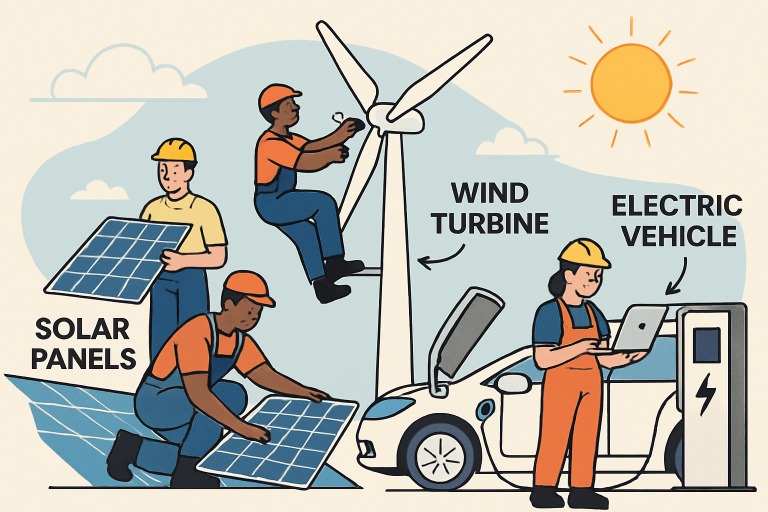Clean energy careers are becoming increasingly accessible thanks to expanded training opportunities at community colleges, technical institutes, and workforce programs. Many in-demand roles, such as solar installer, wind technician, and electric vehicle specialist, require only short-term certifications or associate degrees. Schools like Olive-Harvey College and Danville Area Community College offer hands-on courses that prepare students for immediate employment in the growing green sector. Bloom Energy jobs also represent a key pathway for individuals entering the renewable energy workforce, with positions ranging from field technicians to engineering roles that support clean power solutions. Local workforce agencies, such as the Energy Coordinating Agency in Philadelphia, also provide practical training in energy-efficient upgrades, creating opportunities in underserved communities. The clean energy industry offers wages above the U.S. median, helping close opportunity gaps and supporting workers transitioning from declining fossil fuel jobs. By hiring locally, companies strengthen neighborhood economies and improve resilience against energy disruptions. Beyond economic benefits, clean energy careers contribute to cleaner air and water, lower energy costs, and healthier, climate-resilient communities.
Diverse Career Paths in Clean Energy
Clean energy careers are increasingly accessible through community colleges, technical institutes, and workforce programs, with many roles requiring only short-term training. Opportunities like Bloom Energy jobs and positions in solar, wind, and EV sectors provide above-median wages and help workers transition from fossil fuels. As highlighted in this guide on renewable energy careers, the growing green economy offers multiple entry points for job seekers. Local agencies expand access in underserved areas, supporting economic resilience and environmental benefits. These careers offer diverse paths—from fieldwork to research and advocacy—along with job security, purpose, and a positive impact on communities and the planet.
Educational Pathways and Training Programs
Clean energy careers are becoming more accessible thanks to the expansion of training programs at community colleges, technical institutes, and workforce development agencies. Many roles, such as solar installers, wind technicians, and electric vehicle specialists, require only short-term certificates or associate degrees, making them more attainable. Schools like Olive-Harvey College in Chicago and Danville Area Community College in Illinois offer specialized programs that equip students with high-demand skills. Workforce agencies, including the Energy Coordinating Agency in Philadelphia, further support job seekers by providing hands-on training in energy-efficient home upgrades. The clean energy workforce offers above-median wages and career advancement opportunities, helping to close opportunity gaps and support economic mobility. Local hiring initiatives strengthen neighborhoods and economies, while reducing reliance on declining fossil fuel industries. Beyond jobs, clean energy employment enhances public health, reduces utility costs, and fosters sustainable, climate-resilient communities.

